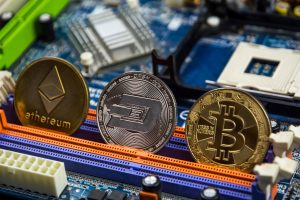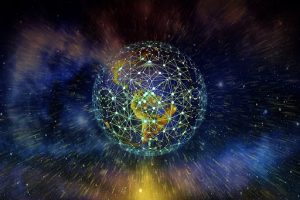Home » Crypto News & Education » Cryptocurrency Passive Income – DeFi » What Is An NFT
The ABCs of NFTs
What is an NFT and what purpose could a digital piece of art serve?

Non-fungible tokens (NFTs) are digital assets that are unique and cannot be interchangeable. They are different from other cryptocurrencies because they can represent physical or digital goods. NFTs also offer a new way to represent and trade unique assets on the blockchain, revolutionizing many industries, such as art, music, and gaming. In addition, they are used to create digital collectibles, which could have a huge impact on the online gaming industry.
NFTs are stored on the blockchain, which is a decentralized database that stores information about transactions. When you buy an NFT, you’re buying a token that represents the asset. The asset could be a digital file, like an image or a video, or it could be a physical object, like a piece of art. However, they are unique because they use smart contracts to enforce ownership. Smart contracts are digital agreements that are stored on the blockchain. Therefore, they automatically execute when certain conditions are met. For example, if you buy an NFT, the smart contract will automatically transfer ownership to you. This ensures that the asset is always owned by the correct person and that it can’t be stolen or copied.
So what are the main benefits for NFT Collectors/Investors?
Passive, Residual Income
NFTs can generate residual income for their owners. For example, if you own an NFT that represents a digital file, you can sell that file multiple times and earn a commission each time it’s sold. On the other hand, if you own an NFT that represents a physical object, you can rent out that object to other people and earn a daily or monthly rental fee. This type of income is called “passive income” because it requires very little effort to generate.
Appreciation
NFTs can appreciate in value over time. For example, if you own one that represents a piece of digital art, that art could increase in value as the artist becomes more famous. On the other hand, if you own one that represents a physical object, that object could increase in value as the demand for it increases. Unlike physical assets, NFTs are not subject to wear and tear, so they can retain their value over time.
Divisibility
NFTs can be divided into smaller units, which makes them more liquid and easier to trade. For example, if you own one that represents a piece of digital art, you could sell that art for multiple pieces of another NFT. In addition, if you own one that represents a physical object, you could sell that object for multiple NFTs. This divisibility makes NFTs more liquid than physical assets and allows them to be traded on a wider range of platforms.
Speculation
NFTs can also be traded like stocks, commodities, or other assets. For example, if you think the price of an NFT will go up, you can buy it and hold it until the price increases. However, if you think the price will go down, you can short it and make a profit when the price falls. Thanks to their divisibility and liquidity, NFTs are easy to trade and offer a great opportunity for speculation.
NFTs have a number of advantages over traditional assets. For one, they’re digital, so they can be bought and sold online without any physical limitations. Second, they’re stored on the blockchain, so they’re secure and immutable. Third, they can represent anything, from art to music to digital files. This allows for a wide range of creative applications. Finally, they use smart contracts to enforce ownership, so there’s no need for third-party intermediaries like banks or lawyers. Ultimately, this reduces the cost of ownership and complexity of transactions.
NFT Revolution?
As you can see, NFTs are being used in a variety of industries and have the potential to revolutionize many different aspects of our lives. Whether you’re a gamer, artist, musician, or just someone who wants to own digital assets, NFTs are a technology worth watching. Specifically, they offer a number of advantages over traditional assets, including divisibility and the ability to generate passive income. Further, they have the potential to appreciate in value over time. In addition, because they’re stored on the blockchain, they’re secure and immutable. Finally, NFTs use smart contracts to enforce ownership, so there’s no need for third-party intermediaries. Above all, this makes them more efficient and cost-effective to trade.
Want to keep learning about everything in Crypto?

Mining For Crypto
To Mine Or Not To Mine? It’s 2022, and the question on the mind of some is: should I start mining cryptocurrency? Cryptocurrency mining is

Binance Smart Chain
Binance Smart Chain How Binance Smart Chain has become one of the most reliable investments for 2022 2022 is proving to be a crucial

Avalanche Blockchain
Why Avalanche is emerging as a Defi powerhouse in 2022 Originally it was Avalanche’s technology. Now the volume of projects is catching our eye. With

Blockchain Bridges
Blockchain Bridges How to Take Advantage of Blockchain Bridges – One of the keys to DeFi The blockchain has proven itself as a real game

What Is KYC
KYC in Crypto Terms What Does “Know Your Customer” Have To Do With Crypto? That Depends If You’re Doing Your Research “Know your customer”, or

Web 3.0 Internet
Web 3.0 – The Evolution Of The Internet A new version of the internet is coming, but what will it bring? The web as we

Decentralized Exchanges
The Top 7 Decentralized Exchanges Discover What is a Decentralized Exchange and the top ones you should try A decentralized exchange is a crypto exchange

Sidechain
Sidechain Hustle Will The Sidechain Be The Solution As Blockchains Start to Scale? As more and more people begin to invest and advocate for cryptocurrency,


